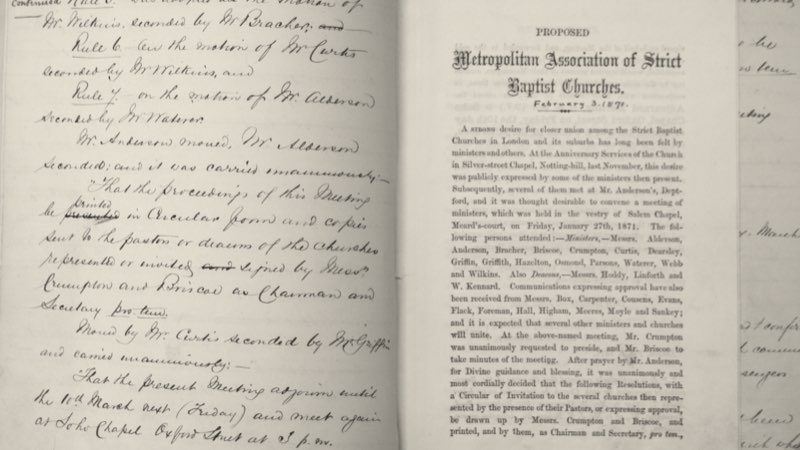-
AHB Worship Services, Jared Smith's Online Worship Services, Jared Smith's Sermons, Jared Smith's Studies In Genesis
Baptism And The Covenants
Those who practice infant baptism, within the tradition of Reformed Theology, do so upon the basis of their covenantal framework. However, there is more than one way to understand the arrangement of the biblical covenants. In this study, we examine several different arrangements, some of which support the biblical teaching of believers baptism.
-
The Formation Of The Metropolitan Association Of Strict Baptist Churches
The formation of the Metropolitan Association of Strict Baptist Churches is inseparably linked with the church meeting at Silver Street Chapel, Notting Hill Gate, and her pastor, David Crumpton. The Association, church and pastor subscribed to a restricted communion table and the tenets of Hyper-Calvinism. These are the leading features which set apart the Strict Baptist denomination from other churches, unions, societies and associations. On 4 April 1866, a Strict and Particular Baptist Church was organized in Stormont House, Queen’s Road, Bayswater, London. Several of the founding members seceded from the Strict Baptist church, meeting on Johnson Street, Notting Hill Gate. On the day of the new church’s formation, David Crumpton was appointed the pastor. Within two years, the church acquired a building—the Silver Street…
-
38 Bible Doctrine – Confessional Statements And Their Proper Use
I would like to welcome you back to another study in Bible Doctrine. In our previous two studies, I have given a historic and doctrinal overview of John Gill’s Goat Yard Declaration of Faith. And then, towards the end of our last study, I pointed out some of the major differences between the 1689 Confession and the 1729 Declaration. In a nutshell, the 1689 Confession is representative of 17th century Hyper-Calvinism, whereas the 1729 Declaration is representative of 18th century Hyper-Calvinism. More specifically, 17th century Hyper-Calvinism, represented by the 1689 Confession, is based on a threefold covenantal framework, pushing to the forefront a conditional covenant of grace. Forthwith, saving faith is viewed as a legal duty imposed upon unregenerate sinners, resulting in a conditional salvation;…
-
The Origins Of The Particular And The Reformed Baptists
This question was recently put to me by a friend: ”Jared are you on the same side with Sam Renihan and his father on the issue of origins of Particular Baptists and Reformed Baptists?” My answer (with a few additions for the sake of clarity): No, we certainly would not be in agreement with the Reformed Baptists’ view on these matters. The reformed Baptist movement began in England during the 1950’s, taking over historic Particular Baptist churches and ‘unreforming’ them to align with their teachings. The group of Particular Baptist churches they commandeered belonged to the Metropolitan Association of Strict Baptist Churches (London). The church that I pastored for twenty years was
-
Monergism.com On Hyper-Calvinism
Monergism.com is a “free and comprehensive online library dedicated to equipping believers with the riches of Reformed Christian theology…through a curated collection of classic and contemporary resources, Monergism.com serves as a hub for those seeking to grow in their knowledge of God, embrace the historic Christian faith, and apply biblical truths to all areas of life.” One would hope, therefore, that the materials provided on the site would offer a fair and accurate account of topics, namely, that of Hyper-Calvinism. Monergism.com would have done well to consult Hyper-Calvinists before outlining a set of their representative beliefs. If so, they could have condensed the list to three items. Hyper-Calvinists believe: (1) Saving faith is the result of regenerating grace, and only those who have been brought…
-
9 The Earthly And Temporary Covenants: The Error Of A Conditional Covenant Of Grace With Its Duty-Faith And Free-Offer Perversions
I’d like to welcome you back for another study in the Word of God. We come again to the subject of the earthly and temporary covenants. And if you remember, I believe these covenants can be arranged under one of two categories. First, there are two spiritual and perpetual covenants—this would be that of Redemption and that of Works. And then secondly, there are four earthly and temporary covenants—that which God made with Noah, with Abraham, with Moses and with David. As for the New Covenant, I don't believe this is an actual covenant, but rather, it's an explanation for the Covenant of Redemption to the Jewish people as a nation as they were then under the Mosaic economy and subject to its laws.







